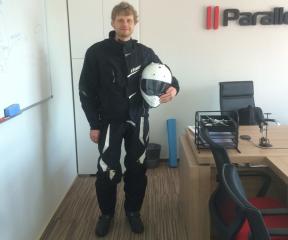Profession Data Scientist PRO - free course from Skillbox, training, Date: November 29, 2023.
Miscellaneous / / December 03, 2023
What will you become after the course?
Option 1. Machine Learning Specialist
You will analyze large amounts of information, create models for forecasting in business, medicine, and industry. Train neural networks, create analytical systems and recommendation services based on machine learning algorithms. Continue professional development in Natural Language Processing or Computer Vision.
Option 2. Data engineer
You will deploy a software infrastructure to organize the collection, processing and storage of data. You will have to solve complex but interesting problems: create fault-tolerant systems for working with Big Data, write effective Python code and SQL queries, automate routine, “communicate” with databases, work with cloud platforms.
Option 3. Data Analyst
You will help businesses make the right decisions based on data. Collect information and analyze it, find anomalies in metrics. Based on your research, you will identify patterns, build hypotheses and test their viability using modeling. Learn to visualize your work results in the form of graphs and diagrams.
Author of the Machine Learning course. Senior Data Scientist, Team Lead at SberData, Sber. 5+ years in the profession
Author of the profession Data Analyst, Product analyst Team Lead at Citrix Corporation (USA), Wrike
Author of the course Machine Learning, Data Solutions Manager, VISA. More than 7 years in Data Science
First level: basic training
The average completion time is 6 months.
Introduction to Data Science
Get acquainted with the main areas of Data Science, find out what problems data analysts, data engineers and machine learning specialists solve. You will go through all stages of working with data. Learn to identify problems, collect business requirements. You will download data from various sources, conduct exploratory analysis and prepare the dataset for further use. Train and implement a ready-made ML model, try yourself as a product and marketing analyst. Learn how to formulate and test hypotheses. Master the basic tools for work: Python, SQL, Excel, Power Bi, Airflow.
Fundamentals of statistics and probability theory
You will understand the principles of working with random variables and events. Become familiar with some types of distributions and statistical tests that are useful in constructing models and testing hypotheses.
Basic Mathematics for Data Science
Gain basic knowledge of mathematics to work with machine learning. You will understand what approximation, interpolation, functions, regressions, matrices and vectors are. Learn to work with mathematical entities in the SymPy Python library.
Internship opportunity
Basic knowledge and skills are enough to get an internship; you can continue studying on the course and in the company at the same time.
Second level: specialization and employment
The average completion time is 6 months.
Specialization 1: Machine Learning
Machine learning. Junior. Learn about machine learning algorithms for solving regression, classification, and clustering problems. Build and train your first neural network. Learn to select model parameters, evaluate the quality and improve it, as well as display the result in Production.
Specialization 2: Data Engineer
Data Engineer. Junior. You will collect complex data sets, prepare data marts, deploy DS projects from scratch, test code, build pipelines for working with data and work in a team.
Specialization 3: Data Analyst
Data Analyst. Junior. Get acquainted with basic analysis methods using sales analysis as an example. You will go through the basics of marketing, BI and product analytics. Improve your skills in Excel, Python and Power BI. You will be able to formulate and test hypotheses and present the results to the customer.
Finding a Job Using the Career Center
A career consultant will help you prepare for an interview at a partner company. You will understand common questions and learn to worry less during interviews. Write a cover letter and format your resume correctly. When you are ready to undergo an interview, a career consultant will organize a meeting with the employer. At the interview, you present the projects you worked on during the course, and your knowledge and skills will be useful for completing test tasks.
Third level: advanced training
The average completion time is 1 year.
Specialization 1: Machine Learning PRO
Machine learning. Advanced. Master algorithms for building recommendation systems and time series forecasting. Learn to apply ensemble methods, stacking, boosting, as well as best practices in cross-validation, monitoring and ML development pipeline. Deep Learning. Learn to work with neural networks: you will learn in detail how they work, you will train models, build and test architectures, transfer data to the neural network and configure parameters. Track 1. NLP. Learn to apply machine learning algorithms and neural networks to natural language processing. You will learn how to analyze the sentiment of texts, classify them, and recognize speech. Track 2. Computer Vision. Using machine learning algorithms and neural networks, you will recognize objects, faces and emotions, classify and segment images. Learn to apply and adapt ready-made CV models for your purposes.
Specialization 2: Data Engineer PRO
Data Engineer. Advanced. Learn to use standard monitoring tools and set up alerts. You will choose an architecture for storing data and work with complex types of storage architecture. Build infrastructure and pipelines for training ML models.
Specialization 3: Data Analyst PRO
Track 1. Product Analytics. You will process data, study user interaction with the product, and interpret the collected information. The results obtained will help solve business problems. Track 2. Marketing Analytics. You will learn how to set up web and end-to-end analytics, create sales funnels, and analyze user behavior on the site. Track 3. BI Analytics. Learn to create data warehouses, design SQL databases, and work with tables at an advanced level. You will solve business problems using analytics, clean data, store it correctly and visualize it.
Final projects
Prepare and present 3 projects in the chosen specialty - introductory, Junior and Middle levels - and add them to your portfolio.
Introduction to Data Science
Consolidate your new knowledge on an individual project - you will go from loading data to implementing a model. Solve the problems of a data engineer, ML engineer and data analyst to decide on your specialization.
Machine Learning
Final project at Junior level. Kaggle competition. Build a model to solve the problem yourself. You will collect and exploratory data analysis, select an ML algorithm and train your model, evaluate its quality and work on improvements. Team project on Deep Learning. Project on Computer Vision or Natural Language Processing.
Data Engineer
Final project at Junior level. Conduct a cohort analysis and download API references. Build dashboards based on the data received. The final Middle level project is a hackathon.
Data Analyst
Junior level. Product Analytics: analyze the results of A/B testing for a product and decide what needs to be developed first. Junior level. Marketing Analytics: prepare data, calculate conversions and LTV. Draw conclusions about the effectiveness of advertising campaigns. Junior level. BI Analytics: build a plan-fact. Create dashboards that will allow you to understand which departments have the greatest impact on company performance. Middle level. Team project on the selected track.
Bonus courses
Developer Career: Employment and Development
You will learn how to choose a suitable vacancy, prepare for an interview and negotiate with an employer. You will be able to quickly get a position that meets your expectations and skills.
Git version control system
Learn to version code changes, create and manage repositories, branches, and resolve version conflicts. Learn useful rules for working with Git.
English for IT specialists
Gain language skills that will help you pass an interview with a foreign company and communicate comfortably in mixed teams.



